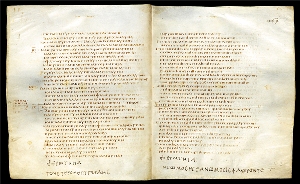
In the fifth-century C.E. Codex Bezae, an early edition of the New Testament written in Greek, the Gospel of Mark describes Jesus’ anger before healing a leper (Mark 1:41). While later scribes changed Jesus’ anger to compassion, it is likely that Codex Bezae preserves the original reading. Image: Cambridge University Library/ff.288v & 289r from Nn.2.41.
Textual variants among ancient manuscripts aren’t usually as controversial as chapter 1, verse 41 of the Gospel of Mark. Sometimes one scribe spelled a word differently on his manuscript, while another might have accidentally skipped or repeated some of the text he was copying. These cases are minor variants and don’t really change the meaning of the text. Other times, however, scribes added to or even changed text to clarify a passage or suit the theological preferences of their communities. That’s when things get interesting, and this passage in the Gospel of Mark offers an especially intriguing example.
In Mark 1:41, a leper has approached Jesus seeking to be healed. Most Greek manuscripts (the New Testament was originally written in Greek), as well as later translations, say that Jesus was moved with compassion and healed the man. A few manuscripts, however, say that Jesus’ anger was kindled before he healed him. So did the verse mean to convey Jesus’ anger or his compassion? If this were a popularity contest, the “compassion” reading would surely win. In 1998, the authoritative book Text und Textwert recorded only two Greek manuscripts (and a few early Latin ones) that contained the reading expressing Jesus’ anger. But, as Dr. Jeff Cate announced in The Folio,* the bulletin of the Ancient Biblical Manuscript Center at the Claremont School of Theology, close examination of one of those two Greek manuscripts has shown that it does not contain the word for either anger or compassion. Just as Matthew and Luke did when retelling Mark’s story in their gospels (cf. Matthew 8:2–4; Luke 5:12–16), the scribe of this Markan manuscript simply left it out.


Mark composes his account of the life of Jesus in this scene from a 12th-century manuscript from Constantinople.
This now leaves the other Greek manuscript, the fifth-century C.E. Codex Bezae, as the sole Greek witness to the reading expressing Jesus’ “anger.” Much like the cheese in “The Farmer in the Dell,” Codex Bezae stands alone.
But most interesting of all, the Codex Bezae may in fact have the better (i.e., original) reading. As New Testament scholar Bart Ehrman pointed out in a 2005 article in Bible Review, “one factor in favor of the ‘angry’ reading is that it sounds wrong.”** It is much easier to believe that early scribes were troubled by Jesus’ anger and changed it to his feeling compassion, rather than the other way around. Later scribes also would have preferred the easier “compassion” reading and copied it until it became the more popular reading. (As Ehrman explains, there are other passages in the Gospel of Mark that seem to support the reading conveying Jesus’ anger.) Thus does Codex Bezae now stand as a lonely witness to what is very likely the original Greek text of Mark 1:41.
Based on Strata, “Jesus’ Anger Rewritten as Compassion,” Biblical Archaeology Review, May/June 2012.

Notes:
* Jeff Cate, “The Unemotional Jesus in Manuscript 1358,” The Folio 28, no 2 (2011), p.1.
** Bart D. Ehrman, “Did Jesus Get Angry or Agonize?” Bible Review, Winter 2005.
Not a BAS Library or All-Access Member yet? Join today.Related reading in Bible History Daily:
The “Strange” Ending of the Gospel of Mark and Why It Makes All the Difference
https://ift.tt/z0hLkq1
This Bible History Daily feature was originally published on May 24, 2012.
Get more biblical Archaeology: Become a Member
The world of the Bible is knowable. We can learn about the society where the ancient Israelites, and later Jesus and the Apostles, lived through the modern discoveries that provide us clues.
Biblical Archaeology Review is the guide on that fascinating journey. Here is your ticket to join us as we discover more and more about the biblical world and its people.
Each issue of Biblical Archaeology Review features lavishly illustrated and easy-to-understand articles such as:
• Fascinating finds from the Hebrew Bible and New Testament periods
• The latest scholarship by the world's greatest archaeologists and distinguished scholars
• Stunning color photographs, informative maps, and diagrams
• BAR's unique departments
• Reviews of the latest books on biblical archaeology
The BAS Digital Library includes:
• 45+ years of Biblical Archaeology Review
• 20+ years of Bible Review online, providing critical interpretations of biblical texts
• 8 years of Archaeology Odyssey online, exploring the ancient roots of the Western world in a scholarly and entertaining way,
• The New Encyclopedia of Archaeological Excavations in the Holy Land
• Video lectures from world-renowned experts.
• Access to 50+ curated Special Collections,
• Four highly acclaimed books, published in conjunction with the Smithsonian Institution: Aspects of Monotheism, Feminist Approaches to the Bible, The Rise of Ancient Israel and The Search for Jesus.
The All-Access membership pass is the way to get to know the Bible through biblical archaeology.
The post Does the Gospel of Mark Reveal Jesus’ Anger or His Compassion? first appeared on Biblical Archaeology Society.
The post Does the Gospel of Mark Reveal Jesus’ Anger or His Compassion? appeared first on Biblical Archaeology Society.


0 Commentaires